Airstrikes Will Not Defeat ISIS, Scholar Says
"It's very unlikely that U.S. airstrikes will be able to stop" the Sunni fundamentalist group's march across Syria and Iraq, professor Vijay Prashad tells "Democracy Now!" on Monday. A coalition of regional militaries and even militias is needed.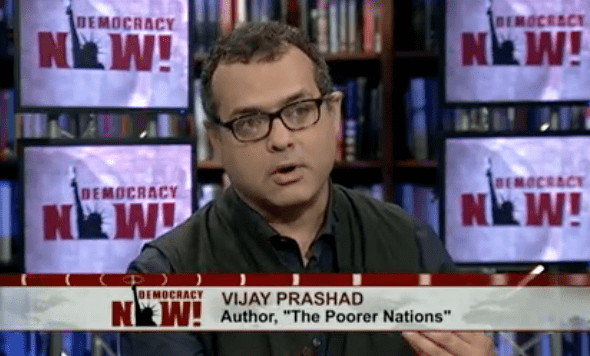
“It’s very unlikely that U.S. airstrikes will be able to stop” the march of the Sunni fundamentalist group ISIS across Syria and Iraq, professor and author Vijay Prashad tells “Democracy Now!” on Monday.
ISIS’ strategy is fundamentally resistant to airstrikes, Prashad says. “For instance, the United States struck recently to protect U.S. ally, you know, the Iraqi Kurds. They struck right outside Erbil, hit the 198 howitzers that the Islamic State had taken from the military base in Mosul. So, when they did that, the Islamic State turned around and went back towards Raqqa. In other words, they are playing a kind of territorial land battle. They are not going to be stopped fundamentally by airstrikes. One tactical mission can be halted, then they will redirect.”
A military defeat of the Islamic State will come only through the use of force on the ground, he continues. But “it’s going to have to come through Kurdish forces, through Iraqi forces, through Syrian forces. And currently, that is not something people are talking about.”
Also mistaken is the view pushed by “Hillary Clinton … the Republicans … [and] Tony Blair” that “the Islamic State is a child of the Syrian war.” These officials “want to deny the fact that the Islamic State has its roots fundamentally in the destruction of the Iraqi state by the American invasion in 2003. You know, it’s very easy to destroy a state. It took the Iraqi people over a hundred years to build institutions; that was destroyed by the Americans in an afternoon. Once you destroy the state, you create a vacuum. For the first time on Iraqi soil, one saw al-Qaida groups come in, and that was in 2004. … The Americans tried to crush al-Qaida in Mesopotamia, but by 2006, despite the big surge, despite the bombing of Fallujah [and] Ramadi… despite the razing of these cities, the Islamic State was born in 2006. It’s not yesterday’s creation. This was a product of the Iraq War.”
Again, “you cannot fight” reactionary fundamentalist forces “with American troops on the ground, because that will simply unite once again people who are not, you know, behind ISIS, but would oppose American troops. They have to be fought by the Iraqis, by the Syrians and by the Kurds. The problem, of course, is that because of U.S. policy over Syria, you know, the United States has a very peculiar and complicated relationship with the powers on the ground. The most powerful fighting force against the Islamic State over the last two years have been the Kurdish militias, but since the United States believes that the Kurdish militias are a terrorist organization—you know, partly because Turkey is a NATO ally, and Turkey considers—The PKK, the Kurdish Workers’ Party—a terrorist organization. But on the other hand, they have been the most fierce fighters against the Islamic State. So the United States is trapped by its Syria policy, by the Turkey policy and by the inability to help reconstruct an Iraqi state.”
‘Democracy Now!’:
— Posted by Alexander Reed Kelly.
Your support matters…Independent journalism is under threat and overshadowed by heavily funded mainstream media.
You can help level the playing field. Become a member.
Your tax-deductible contribution keeps us digging beneath the headlines to give you thought-provoking, investigative reporting and analysis that unearths what's really happening- without compromise.
Give today to support our courageous, independent journalists.
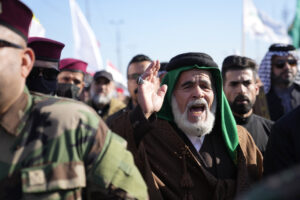
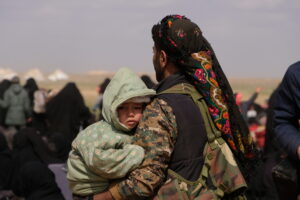
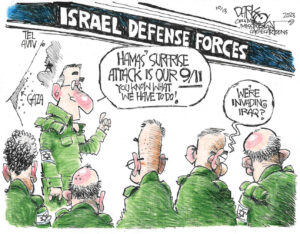

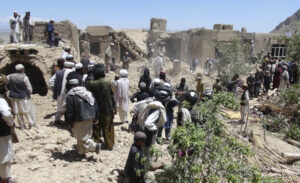
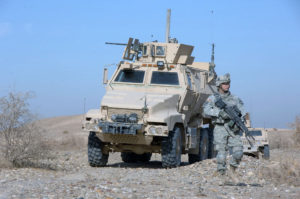
You need to be a supporter to comment.
There are currently no responses to this article.
Be the first to respond.